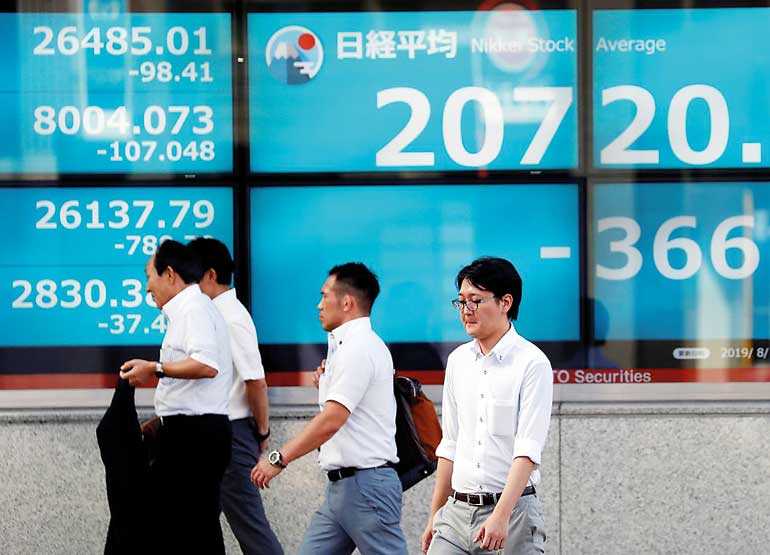Wednesday Feb 18, 2026
Wednesday Feb 18, 2026
Wednesday, 25 December 2019 00:19 - - {{hitsCtrl.values.hits}}

Men walk past in front of an electric screen showing Japan’s Nikkei share average outside a brokerage in Tokyo, Japan, 5 August – Reuters
TOKYO (Reuters): Asian shares and US stock futures darted in and out of losses on Tuesday, as the holiday lull offset optimism that a US-China trade deal will boost exports and corporate earnings.
MSCI’s broadest index of Asia-Pacific shares outside Japan was down 0.01%.
Blue-chip shares in China rose 0.29% after Premier Li Keqiang said on Monday the government was considering more measures to lower corporate financing costs.
Australian shares were unchanged, while Japan’s Nikkei stock index edged 0.02% lower.
Sterling traded near a four-week low versus the euro and a three-week trough against the dollar on growing doubts over how Britain will navigate the transition period for its exit from the European Union.
Oil prices held steady before data on US crude inventories later on Tuesday, but there are signs that recent supply cuts may not last after Russia’s energy minister said oil producers could ease output restrictions in March.
Wall Street’s main indexes posted record closing highs on Monday after US President Donald Trump said an initial US-China trade pact would be signed soon.
A de-escalation of a trade conflict between the world’s two-largest economies is a positive for companies that feed global supply chains, but some investors want to wait until next year to see how long the current thaw in Sino-US relations lasts.
“Risks to the outlook receded this year, which supported financial markets, but we cannot say the same thing about next year,” said Hiroshi Miyazaki, senior economist at Mitsubishi UFJ Morgan Stanley Securities in Tokyo.
“No one can predict what will happen with US-China relations, and the US still has some tariffs on Chinese goods in place.”
Trading is expected to be subdued as many financial markets will start closing from Tuesday for the Christmas holidays.
US stock futures were unchanged in Asia after the S&P 500 gained 0.09% and the Dow Jones Industrial Average rose 0.34% on Monday.
Shares of Boeing Co gave the Dow a big boost after the planemaker ousted its chief executive officer over a prolonged crisis following two fatal crashes of its best-selling 737 MAX jetliner.
Equity investors got a rare double dose of positive news earlier this month when Washington and Beijing agreed a preliminary deal to avoid additional US tariffs on Chinese goods and a British general election gave the ruling Conservative Party a free hand to enact its Brexit agenda.
However, the currency market shows some investors remain circumspect, because new problems with trade friction and Brexit could easily emerge next year.
Against the euro, sterling was quoted at 85.72 pence, close to its lowest since 22 November. The pound traded at $1.2944, close to its lowest since 2 December.
Sterling has given up all the gains it made immediately after the British general election on 12 December.
In the onshore market, the yuan fell to 7.0140 per dollar.
China’s government is considering broad-based and “targeted” cuts in banks’ reserve requirement ratio to lower financing costs for small firms, the country’s premier said on Monday, showing policymakers remain under pressure to counter an economic slowdown.
Under the so-called Phase 1 trade deal, the United States suspended tariffs on Chinese goods that were scheduled to go into effect on 15 December in exchange for a doubling of Chinese purchases of US agricultural goods.
However, the United States left in place 25% tariffs on $250 billion of Chinese goods.
US crude ticked up 0.03% to $60.54 a barrel, and Brent crude rose 0.12% to $66.47 per barrel before an American Petroleum Institute report on crude inventories later Tuesday.
OPEC and other leading oil producers may consider easing oil output restrictions at their meeting in March, Russian Energy Minister Alexander Novak said in an interview aired on Monday.